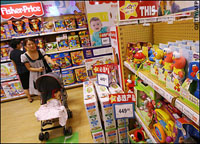China does its best to meet international safety standards

The European Union rises the ban on certain toys and products from China, saying the country was working hard to ensure its exports meet international safety standards.
The EU had demanded China raise safety checks on exports, after European consumers were hit by numerous recalls of Chinese-made toys this year.
But an EU review of Chinese efforts found Beijing has shown "considerable progress ... in taking corrective actions to stop the flow of dangerous goods onto the European market."
Meglena Kuneva, the EU's consumer affairs commissioner, said she has been working with producers, importers, retailers and governments "to rapidly identify and tackle any new problems as they emerge," as the Christmas shopping season begins.
Kuneva said she got fresh assurances of compliance from Chinese authorities and toy makers that they would meet safety standards. She presented proposals to rebuild consumer confidence and prevent dangerous goods from making their way to shop shelves.
The measures, however, would only be implemented over the coming months - too late for the Christmas rush.
"You cannot give 100 percent guarantees, but you can make sure the system is fit for purpose," Kuneva said.
European Commission officials launched a review of safety controls across the 27-nation union in September, and conducted an analysis of Chinese safety standards in the wake of recent recalls.
The review of Chinese controls looked at 268 safety alert notifications and found that China made a "significant effort" to correct or halt exports of unsafe products, adding that Chinese authorities were setting up their own rapid warning and investigation teams.
Kuneva had warned the EU was prepared to impose a ban on some Chinese goods if no progress was made by this month.
The EU review found, however, that there "are still significant problems within the industry in making sure, particularly at the lower end of the market, that toys are safe."
European Consumers' Organization BEUC, which represents 40 national consumer rights groups across 30 European nations, agreed, adding that EU toy safety legislation "has not been properly applied in recent years."
"Problems have arisen with sometimes inadequate levels of enforcement by national authorities and also in the liaison between the European Commission and national authorities," it said in a statement.
The group said recent recalls suggest "too much faith" had been placed in the industry to issue voluntary recalls and called on EU authorities to take up more responsibility for testing and surveillance.
It urged manufacturers to perform their own safety audits, boost training of Chinese workers and clients on EU toy safety standards and "work to improve recall success rates."
Kuneva called for manufacturers, retailers and importers to agree to a safety pact - "to rebuild consumer confidence."
EU member nations were asked to update EU-wide regulations on toy safety, notably to ensure that products include warnings about the dangers magnets can pose to children if they swallow them.
Other recommendations include improving the ability of authorities to trace products in the manufacturing chain and increasing cooperation with U.S. and Chinese authorities on drafting possible new import controls.
Concerns over toy safety remain high after the U.S. company Mattel Inc. ordered recalls this year of more than 21 million Chinese-made toys, including Barbie doll accessories and toy cars, because of concerns about lead paint and tiny magnets that could be swallowed.
The company's own tests found lead levels in paint on recalled toys as high as 200 times the accepted level.
El Segundo, California-based Mattel later apologized for the recall, acknowledging the problem with the magnets was a design flaw, and not the fault of Chinese manufacturers.
Half of all unsafe imports found in the EU come from China - reflecting the huge volume of imports from the world's most populous nation to the union, whose population is 490 million people.
China has become a center for the world's toy-making industry, exporting US$7.5 billion (EUR5.3 billion) worth of toys last year.
Subscribe to Pravda.Ru Telegram channel, Facebook, RSS!


